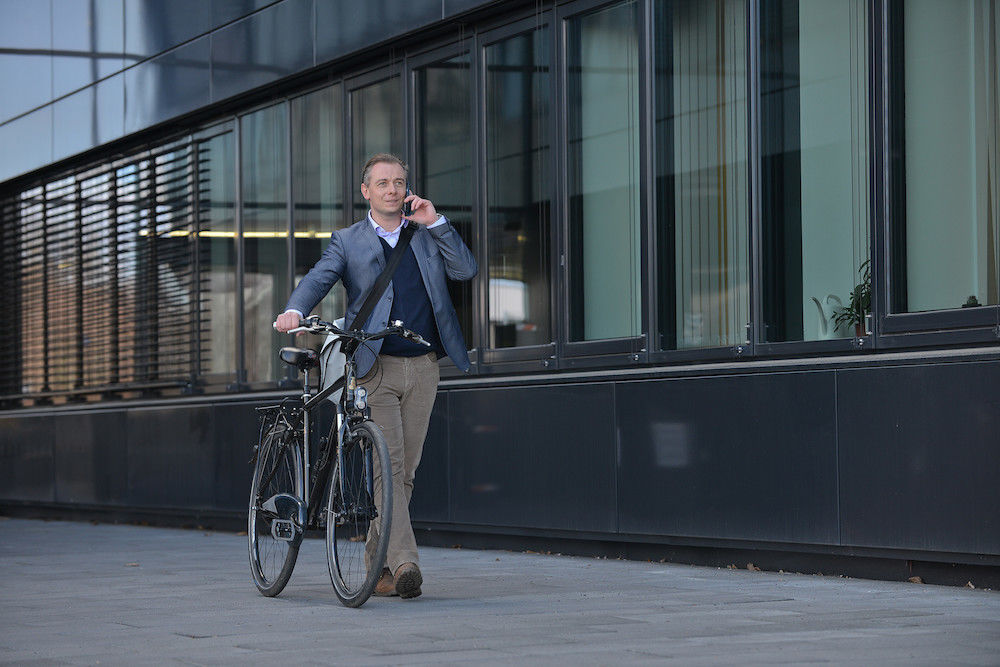The biologist and the inventors

In the Long Night of Sciences, he talked about chance inventions – from the ice lolly to the post-it note, which was actually supposed to be a super-strong adhesive. Dr Robert Szczesny made the guests smile – and also amazed them with his tales of inventions which originate entirely from Halle. “The responses were good. The auditorium was full every time. That was good,” he says. Szczesny has worked as a technology scout at the university for years. At unit 6.3 “Transfer and Start-up Service” – called the “Service Centre for the Protection and Exploitation of Ideas” until February – he is now primarily responsible for the protection of intellectual property (IP), for questions relating to patent, competition and copyright law and for the acceptance and examination of invention disclosures from the university. This sounds like a lot of paper and bureaucracy. “But if you enjoy science, technology and progress, then it is not dry at all,” he stresses.
A few years ago, the 41-year-old, who comes from Wimmelburg near Eisleben, stood in the laboratory in the Weinberg Campus himself. He studied biology at the MLU starting in 1997, he did his doctorate in 2009 in the area of plant genetics and then worked for one and a half years with an American company on a collaborative project. The scientist says that the job in the laboratory – he most recently worked on DNA binding proteins from bacteria – was interesting. But: “Helping to get applied research going is even more interesting for me.” When the collaborative project ended in 2012, chance came to his aid. The university was looking for a technology scout for the first time. Instead of dealing with bacteria and proteins, Szczesny now combed through publications by MLU scientists, got an overview of the research in the individual fields and held discussions. Always with the question: Can we make something out of this; is a transfer from research possible? However it is utilised – an application for property rights, the foundation of a company, the relevance for science, business or society: “we are very open-minded,” he says.
Trying to understand scientific publications from other fields was not difficult for the biologist who worked as a technology scout until the end of September 2018. “Biology is a cross-sectional science anyway,” he says. And it is not necessary to understand every detail of a paper. “Scouting is a question of getting an initial idea, then having a discussion with the scientist and grilling them on the subject.” He estimates that around a quarter of researchers proactively search for a path to the experts from the Transfer and Start-up Service. “I have also discovered that many of them are very frank when I call them.”
It is not only the name of the unit in which he still works, although with a different remit, that is new. There are also other changes. For example, external law firms will take over the patent applications on behalf of the university and will represent the university in court if applicable in the future. They will be consulted as required and for specific disciplines, which has definite advantages from Szczesny’s point of view. For example, several law firms could work in parallel on different applications. This structure is now being pursued by an increasing number of universities, according to Szczesny. He sees himself as a point of contact between the university with its scientists on the one hand and the law firms on the other hand. To fill this position as well as possible, Szczesny started another course of study in 2017: alongside his work, he aimed for a master’s degree in patent engineering. “Life-long learning is great, life-long examinations are not really so much fun,” he says with a twinkle in his eye. But there was actually not a big step up to the course of study. He was not entering completely new territory anyway: “As a scout, I had already been confronted with the topics, and have given seminars on them.”
Szczesny says that he still doesn’t regret moving from the laboratory to the desk. “The exciting thing about the transfer of technology is that, with the right questions or hints, you sometimes guide basic research in a direction where society will be able to benefit in addition to the gain in knowledge.” For him, this is not so much about the commercialisation of science as about its practical benefit. His tasks also include research the start of the art when it comes to new inventions that are to be patented. In other respects, an important rule still applies with regard to patent protection: apply first, then publish.
The IP manager sees it as a major advantage that so much science has been brought together at the Weinberg Campus in recent years, where he is based. This makes agreements with the researchers easier, in particular. “We can meet for a coffee or I can just go quickly over there,” he says. In his leisure time, Szczesny likes to ride his bicycle and enjoys every hour that he can spend cycling through the countryside. He also uses it for his journey to work and for getting around campus for work. “I am simply faster on my bike,” says the father of two.
Dr Robert Szczesny
Research, transfer and third-party funding service
Dept. Transfer and Start-up Service
Telephone: +49 345 55-21414
Mail: robert.szczesny@verwaltung.uni-halle.de
